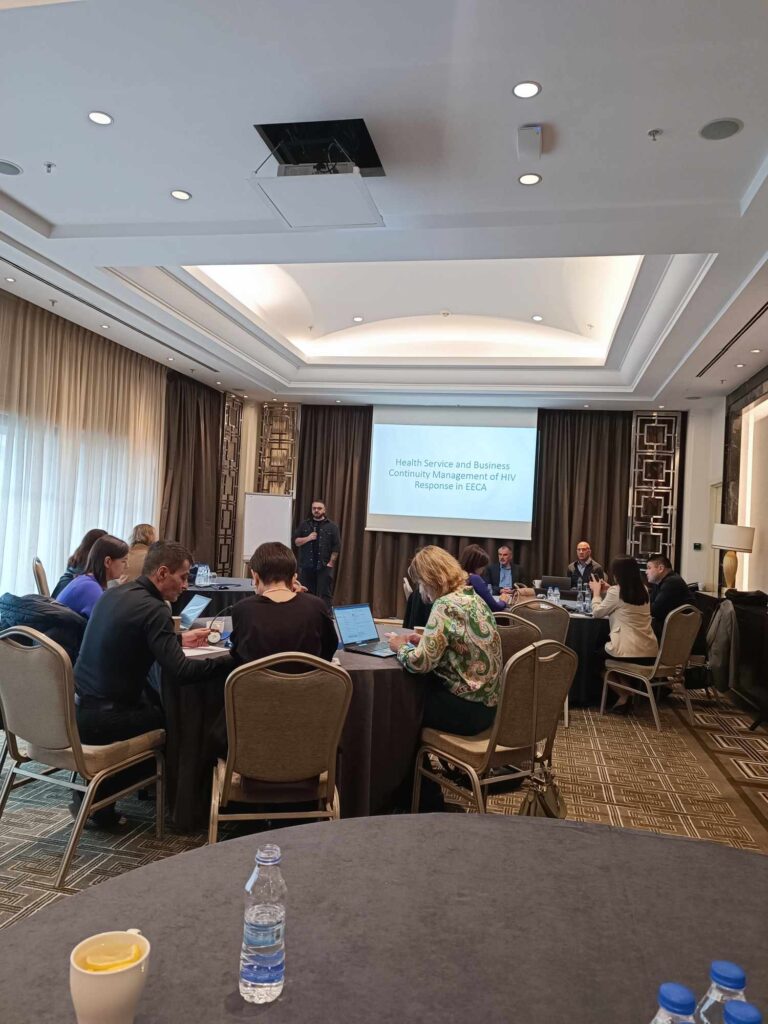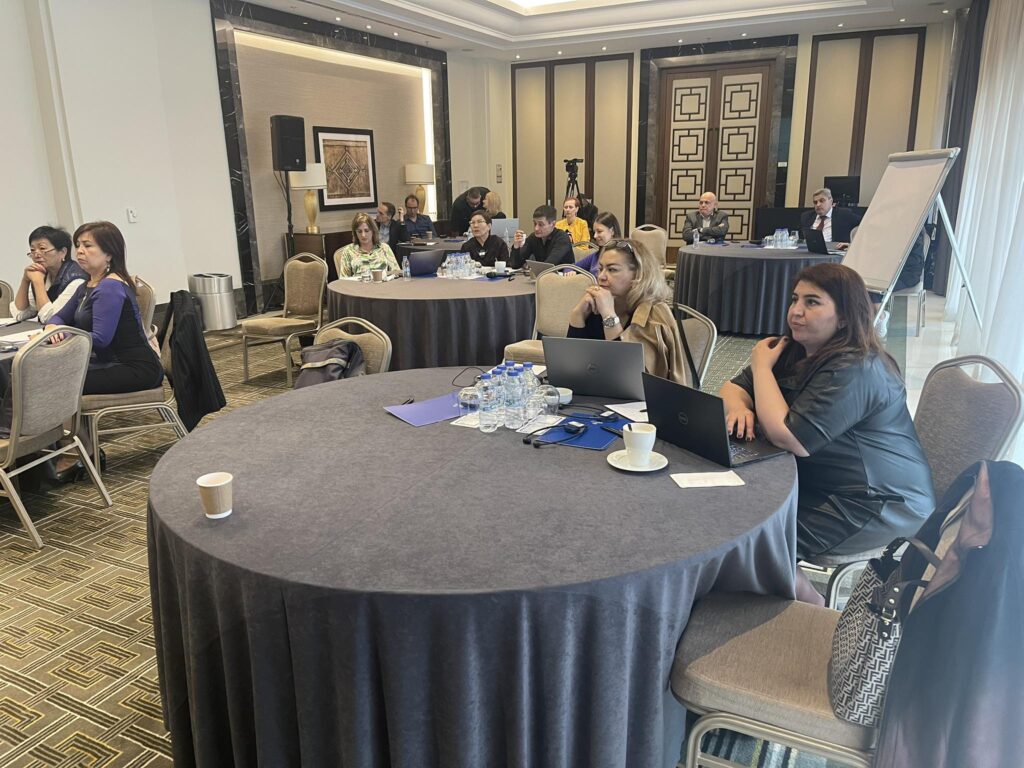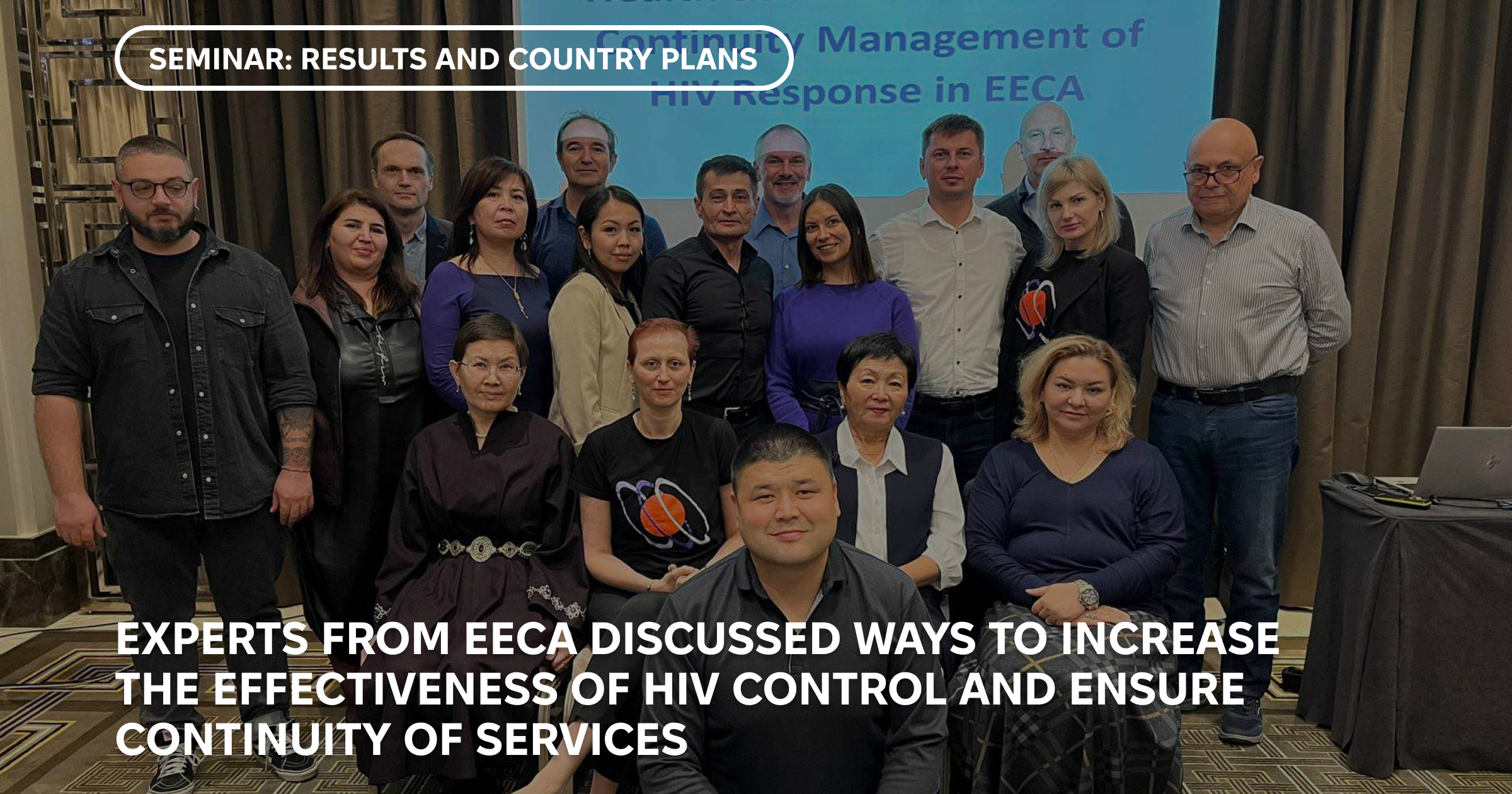November 2-3, 2023, a two-day seminar, “Managing the continuity of health care services and business in the field of HIV in the region of Eastern Europe and Central Asia (EECA)” was held in Istanbul. The event was attended by representatives of the countries of the EECA region and discussed the development of strategies for managing the continuity of processes in health care and HIV.
The main points:
- The participants of the seminar expressed a common goal to create a structured planning for five countries: Azerbaijan, Kazakhstan, Kyrgyzstan, Tajikistan and Uzbekistan, as well as a regional project in the field of combating HIV/AIDS.
- The importance of the topic of discussion was confirmed by the World Health Organization (WHO), noting: “building the resilience of the health system to ensure PHC and health security during and after the COVID-19 pandemic”.
- The workshop participants discussed the importance of developing comprehensive programs to respond to crises, including military conflicts, the influx of refugees and other crises.
- The workshop participants also discussed the importance of ensuring continuity of health services, in particular HIV, in case of emergencies.
What the participants said at the end of the event:
Kateryna Ryzhkova-Sebeleva, coordinator of #SoS 2.0 in the Social Equation Hub, stressed: “For our part, we discussed in detail the requests from the representatives of Azerbaijan, Tajikistan, Kyrgyzstan, Kazakhstan and Georgia for the implementation of ISO 22301:2021 at the country level, formed specific further joint steps. Thus, shortly, our team will hold individual meetings to finalize these requests and agree on an algorithm for developing strategies for the continuity of HIV services in emergencies. We will decide that thanks to this approach, we will be able to adapt the national health systems of these countries to unforeseen situations, based on the case of Ukraine.”
The importance of the topic of discussion was confirmed by the World Health Organization (WHO), noting: “building the resilience of the health system to ensure PHC and health security during and after the COVID-19 pandemic”. As Saikat Sohel pointed out in her presentation, “In emergencies that require additional resources, health facilities that have continuity of service plans are more likely to provide continuous, high-quality health services than those that do not.”
Maka Gogia, the Focal Point of the SoS 2.0 project in Georgia, added: “Business continuity thus seems to be an innovative approach that can be applied both at the level of an individual HIV program and at the national level in Georgia. In our case, we discussed one specific problem faced by the harm reduction program: the lack of legal status of the Needles and Syringes program, which could negatively affect the transition from the Global Fund to public funding, given the fact that this program is being implemented by NGOs/SRH in the country. We plan to develop a risk assessment and safety network with technical support from the GF and SEH team.”
Hennadii Honak, PHC of the Ministry of Health of Ukraine, says: “We are developing a business continuity project in accordance with ISO 22301:2021 with the support of the #SOS 2.0 project. This project includes four phases: external assessment of the organization, adaptation of consultant templates, business impact analysis, and risk assessment. An independent certification body will issue a certificate confirming our compliance with the standard. This will allow us to ensure the continuity of the entire Public Health Center, in particular, laboratories for diagnosing infectious diseases and controlling the epidemiological state in the country. It will also help us manage the procurement of necessary resources to ensure continuity of treatment and medical equipment, improving the quality and timeliness of emergency services.” In addition, we intervened in the Global Fund’s application for the next funding stage.
The workshop became an important platform for exchanging knowledge, experience and innovations in business continuity management and improving the sustainability of the healthcare system in the EECA region. Participants actively discussed important topics such as technical and programmatic aspects of business continuity management and improving health systems’ resilience.
Also, their feedback was shared by Sayora Ziyoyeva, Specialist for Surveillance and Transition of the JCC of Tajikistan and Zarina Davlyatova, Specialist for Health Systems Strengthening and Capacity Building (HSS and Capacity Development Specialist) in the UNDP project team in Tajikistan. They noted the extraordinary value of the information received at the West for Tajikistan. Risk analysis and assessment, information security, and country readiness to transition from the Global Fund to self-government are all aspects that countries need. They reported that with a risk plan, the government can develop a model for managing them and prepare for a regular transition plan. This contributes to increasing the resilience and potential of the country; there will be full preparedness for any crisis situations.
That is why a joint meeting with stakeholders of the process will be held in the near future and an algorithm for the implementation of this activity at the community and NGO levels, as well as at the national level, will be developed. It is also planned to seek technical assistance from the GF and the Social Equality Hub to adapt the Tajikistan process next year.
Orujov Yashar, Director of the Project Implementation Unit of the HIV/AIDS, Tuberculosis and Malaria Programme of the Ministry of Health of the Republic of Azerbaijan, said: “Even before the event, we received instructions from the Ministry of Health of the Republic of Azerbaijan to establish a working group on budget advocacy and provision and sustainability of public health services. It includes representatives of the Ministry of Health, the Institute for Tuberculosis Control, representatives of the AIDS Center and representatives of NGOs. The group should work with me to develop recommendations for responding to unforeseen situations. In addition, we have included this area of work in the application to the Global Fund for the next round of funding to ensure the continuity of business processes in the healthcare system. The plans include further cooperation with partners to implement the outlined activities at the country level. “
Amanzholov Nurali from the Central Asian Network stressed the importance of developing comprehensive programs to respond to crises. It is planned to involve a national coordinating committee to effectively implement response plans, taking into account various scenarios, including military conflicts, the influx of refugees and other crisis situations. The organization has already developed a plan for responding to COVID-19 but understands that problems can be diverse, and plans to work on strategies with a broader focus. The country has already held consultations with the experts of the Social Equation Hub and next year it is planned to adapt the response plan following the international standard ISO 22301:2021.
Ilimbek Sadykov, an expert from Kyrgyzstan, noted, “Continuity of services is a priority for us! Our state program determines this, HIV prevention policy and within the framework of sustainability work, we work with international organizations and at the national level. Next year, we plan to work on this approach with NGOs and update this issue at the national level. Work is also underway to transfer funding from international organizations to the national budget, some of which are already being transferred. At the meeting, we were able to see what the challenges are for the countries of the region to ensure sustainability, we understand that the context is different for everyone, but the only thing is that all countries focus on the continuity of services, this is a priority for them. This meeting allowed us to stop and check the clock, see at what stage we are, what stages and dynamics of work in other countries, how we can adopt the positive practices of these countries and avoid negative ones. Such regional platforms allow us to rethink and compare ourselves with other countries, adjust, and clarify our work.”
The workshop became an essential platform for exchanging knowledge, experience and innovations in business continuity management and improving the sustainability of the healthcare system in the EECA region. The workshop participants discussed important issues related to ensuring continuity of health services, in particular HIV, in case of emergencies.
Recommendations:
- Governments of EECA countries should continue to implement strategies for managing continuity of health services, in particular HIV, in order to increase the effectiveness of HIV control and ensure access to quality health services for all people, regardless of the circumstances.
- Support should continue to be provided to EECA countries in implementing health continuity management strategies.
Organizer of the event “Hub of Social Equality” with the support of the Alliance for Public Health within the framework of the regional project #SoS 2.0.








